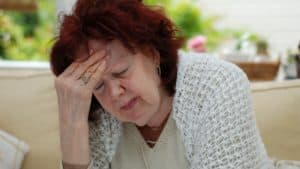
It was on the one hand, a terribly difficult decision to make. On the other, it felt like there was no other option.
My husband had been suffering with stomach cancer for the best part of a year. Initially, we were hopeful, but after the operation did not get all the cancer out, we were left with him facing the end, only being offered a second round of chemo, with a 5% chance of giving him a bit longer. He didn’t want to die, so he said yes to that option.
But within a couple of days of taking the chemo pills, my husband looked awful.
This Was His Decision
Over the conservatory breakfast table one morning, with the sun shining in and the birds tweeting outside, me eating, him watching, he said:
“I feel like a zombie. This is really dreadful. I’ve been thinking it through – I just can’t do it. I’d rather be here fully alive and relatively well than feel like this. Is that okay with you?”
I looked deeply into his eyes. I had seen him struggling to come to terms with something, and we both knew what this meant.
It was not an easy decision for my lovely man, nor was it easy for me to agree with him that it was okay. And yet I had watched him suffer, and when you love someone, the last thing you want is for that to continue.
“Of course it’s okay with me. I will support you whatever you decide,” I told him.
Despite the fact it meant he would be leaving me sooner than what either of us wanted, I just couldn’t disagree with him. That night, I cried silent tears by myself.
He had a few more weeks of relatively good health and we had many joyous times together, as we refused to entertain thoughts of the future and simply delighted in being here now, as all the spiritual sages advise us to do.
Medical Decisions with Coronavirus
Nowadays with coronavirus, there are equally difficult treatment decisions you may have to take. But if you haven’t thought them through beforehand, like my husband did, they will be almost impossible to make.
The last thing you will want is to be like the Scottish woman who received an unexpected phone call from her doctor.
She said: “I was a bit startled when asked whether I wished, if I got ill, to be resuscitated. In fact, I was so taken aback, I wasn’t able to give them an answer over the phone, so the option was to leave things as they are, which means I would receive resuscitation, no matter what.”
She clearly did not have the information required to be able to make an informed decision that she felt okay about, nor did she have the time needed to process the question.
Let’s face it, many of us at Sixty and Me are of an age that could be deemed at risk right now, though, of course, it depends on your individual situation.
And the likelihood is that you won’t die. But on the other hand, you could, as has already been shown.
It is really important, therefore, to think through what kind of treatment you would NOT want should you contract the virus seriously.
If you’ve done this in advance, then you will have a very different response to what this Scottish lady had.
Planning for Unexpected End of Life
Helping people think through their particular options towards their end of life is one aspect of what I do. I started doing end-of-life planning work after my husband died in 2011, when I wrote about all the questions I had asked him in his last year.
If you don’t know what kind of information you will need to consider that would make the situation easier on you and your family, or the wording you need to use in your written document, then you can get the opportunity to discuss these issues in a special Advance Coronavirus Care Statement online workshop I’m offering to Sixty and Me readers.
Hopefully, you will never need this. But just in case, you will be prepared.
Think of it like insurance – you hope you’ll never need it (and you probably won’t) but just in case, you’ve taken care of yourself, your family, and the doctors, as best as possible. And that brings relief, comfort, and some sense of control in this time of uncertainty.
Do you know what you wish for your end-of-life care? Does anybody else know? Have you written down your statement? Please share what you have done to prepare for a just in case situation.





